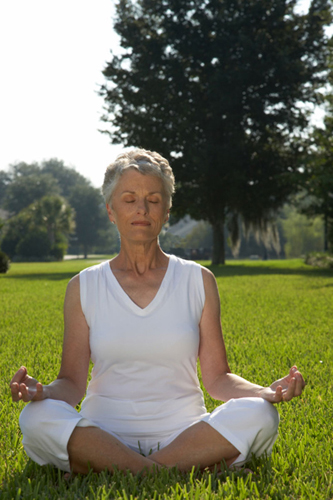| Q: |
Does sleep quality change with menopause?
|
| A: |
During menopause, many women are less satisfied with their sleep
than previously. The most common complaint is difficulty falling asleep.
Other problems include an increase in night-time awakenings and daytime
drowsiness. However, actual sleep time and sleep stages are not
different from those in premenopausal women, so differences in
perception of poor-quality sleep probably have a more subtle background.
|
| Q: |
Are all sleep and health problems in menopause related to changes in hormone levels?
|
| A: |
Many women assume that symptoms such as weight gain, sleep
disturbances, and fatigue are related to hormonal changes alone, but
this is a misconception that can lead to women missing potentially
reversible and treatable causes of poor health. Postmenopausal women are
at increased risk of snoring and sleep-disordered breathing, which can
be the cause of daytime sleepiness and fatigue. These conditions can be
treated to improve the quality of life remarkably.
|
| Q: |
Why do I get hot flashes?
|
| A: |
No one knows the precise mechanism of hot flashes or night
sweats. Hot flashes can also occur in women receiving certain treatments
for breast cancer. Hot flashes are worsened by smoking, excessive
weight, and physical inactivity. They last about 3–5 minutes, but
sometimes can go on for 20 minutes. Some women have up to 20 hot flashes
a day; others 1–2 times a week. Hot flashes cause awakenings at night,
and women report diminished sleep quality, but there is little evidence
to show any major disruption to the various sleep stages.
|
| Q: |
What can I do about hot flashes affecting my sleep?
|
| A: |
If the flashes are extremely disruptive, short-term hormone
therapy (HT) is still the treatment of choice. However, many women are
reluctant to try this due to the associated health risks. HT should not
be used by anyone who has had breast cancer or a stroke.
Antidepressants, such as selective serotonin reuptake inhibitors
(SSRIs), or gabapentin may be useful.
|
| Q: |
Can alternative therapies help with hot flashes?
|
| A: |
The evidence for complementary and alternative therapies is not
strong and their effectiveness is questionable. It might be worth trying
acupuncture, yoga, or herbal treatments containing phytoestrogens such
as red clover, soy, dong quai, or black cohosh. Obviously a cooler
bedroom environment is better than a warm or hot one.
|
| Q: |
How does stress during menopause affect sleep?
|
| A: |
As estrogen levels decline, the heart and blood vessels as well
as other hormones become more sensitive to stress. Increasingly, there
is evidence that even day-to-day hassles can impact sleep more
significantly during menopause and result in frequent awakenings, less
sleep time and slow wave sleep, and poorer quality sleep overall. It is
therefore important to try and minimize stress in your life.
|
| Q: |
Are there any particular sleep disorders associated with menopause?
|
| A: |
Obesity, raised blood pressure (hypertension), and sleep apnea
are more common after menopause. Increases in weight can’t be blamed
just on menopause; they are more likely to be the result of normal aging
and reduction in physical activity. Obesity is a risk factor for sleep
apnea.
|
| Q: |
Are there any other medical illnesses that are more common after menopause and that can disrupt sleep?
|
| A: |
Depression and mood disorders become more common after menopause
and can result in sleep disruption. Undergoing a hysterectomy after
menopause can worsen symptoms of menopause and lead to mood problems.
Cancer becomes more common after this stage in life as well and has its
own problems associated with diagnosis and management. The incidence of
thyroid problems increases and is more common in women; hypothyroidism
is associated with fatigue.
|
Menopause
Menopause, the transition into
midlife, is a normal event in every woman’s life and most women live
long enough to experience it. Generally, menopause is said to be present
once there has been an absence of any menstruation for 12 months.
The average age at
which menopause occurs in Western societies is 51.4 years but it can
occur between 40 to 58 years and is also influenced by lifestyle and
genetic factors such as smoking, obesity, ethnicity, oral contraceptive
use, age at menarche, and duration of breast-feeding. Some women can
experience a very early menopause, in their thirties, and if the ovaries
are removed at any age after puberty, menopause will result.
The time immediately
before and after menopause is called the perimenopausal period. It is a
period of transition where changes take place in the hormonal system and
brain (with the decreasing production of estrogen and progesterone).
Sleep disturbances and daytime fatigue are the most commonly reported
symptoms during menopause. Other symptoms include hot flashes, mood
disorders, and night sweats.
